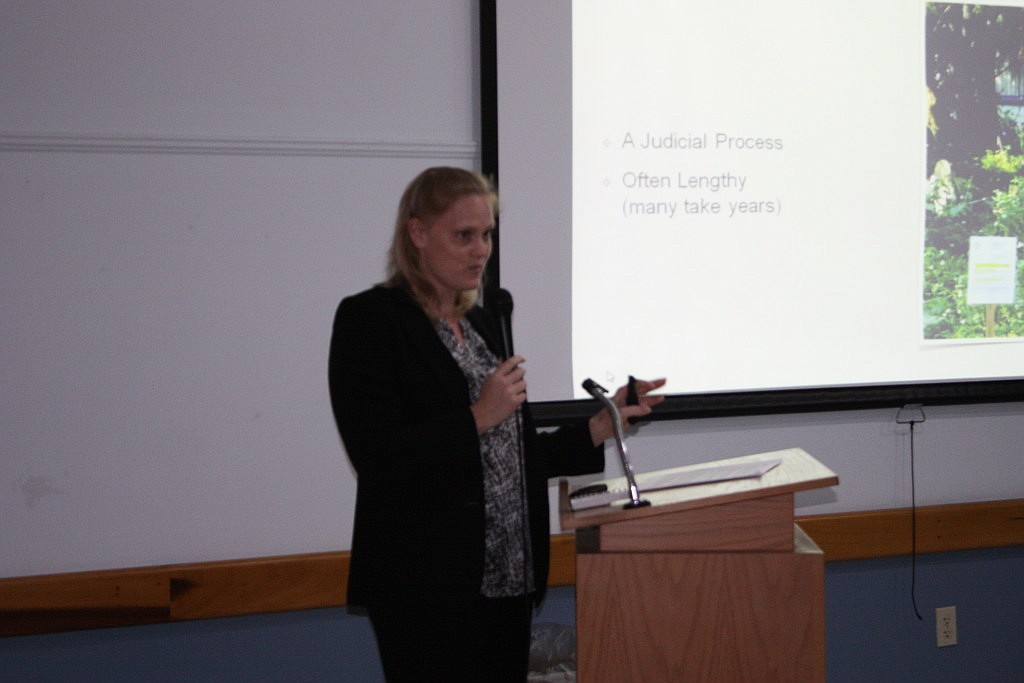- April 24, 2024
-
-
Loading

Loading

Official mentions programs that help people in foreclosure danger.
When the housing bubble popped in 2008, a rash of foreclosures followed, leaving vacant houses sprinkled throughout the nation’s cities. The effects are apparently still around, as about 75 people crowded the auditorium at the Ormond Beach Regional Library on May 14 to hear about the situation.
Citizens for Ormond Beach, a volunteer civic group, has studied the problem in detail the past few months and invited the public to see a presentation on causes and solutions.
“Many of these houses have been shuttered for years,” said organization President Rita Press. “These houses are not like fine wine, which gets better with time.”
One of the main points made in the presentation was that the city does not have a code for maintenance of house structure. The city codes mainly deal with the care of the lawn.
Also, the institution that holds the mortgage should be held responsible, said Anita Lapidus, of CFOB. She said there should be codes for structure, and either the owner or mortgage holder should be found in violation of the code.
“They go after the title holder, who is long gone,” she said.
Currently, banks must provide the city with the address of a property that becomes vacant and where foreclosure has started. They must then arrange to have the lawn mowed.
However, research by CFOB revealed vacant houses under foreclosure notice that were not on the city’s list.
Also, Lapidus said, the fee to register an abandoned property should be increased so that an enforcement program would “pay for itself.”
Other solutions offered by the group included adding more code enforcement staff, forming a committee to monitor the situation and providing education on how to avoid foreclosure.
Press said the good news is that the city has been taking steps to remedy the situation.
“This is a city that listens to activists,” she said. “Sometimes activists have to nudge them along.”
City Manager Joyce Shanahan said the City Commission told the city staff last year to look at house maintenance issues.
“We are looking at the code and plan to address the issues,” she said. “I think we are moving ahead together in the right direction.”
She said they must abide by code regulations issued by the state, such as notifying the property owner.
She also acknowledged that the abandoned property list is not always accurate.
“We are constantly working on the registry,” she said. “It’s hard to keep up because the banks change so frequently.”
Fran Gordon, of Mid-Florida Housing Partnership, said the best way to solve the problem is through prevention. She mentioned two programs that can help people who are in danger of foreclosure. One is called Florida’s Hardest Hit Fund, and will pay the mortgage for a year.
The other is called the Principal Reduction Program. She said that when it opened, it had 10,000 applications statewide, and was only open for a short time. She said it was now open again.
For information on the programs, she said to call 386-274-4441, Ext. 301.
Margie Patchett, who said she has worked as a real estate closer “for years,” said the city should issue liens on problem properties. She said at some point the liens will be paid at a closing.
Even though the problem is being looked at, Press thinks more investigation should be done. She said she wants to find out why banks are not foreclosing.
“I want that to be published,” she said.
John Adams, of Adams, Cameron and Co., Realtors, agreed that “it all comes down to code enforcement,” and property owners should be held responsible.
“A lot of people (under foreclosure notice) think they can just mail the keys to the bank, and then five years later they find out they still own it,” he said.
He said it takes banks a long time to foreclose on properties “because there are so many.”
A speaker in the audience had a novel approach.
“I think we can view the vacant houses as a resource,” she said. “We can decide what kind of neighborhood we want.”
She suggested that people might want to open small businesses in the houses, and the city should look at the barriers to potential business owners.
During their investigation, CFOB found homes that were receiving the homestead exemption, even though they were not occupied by principal owner, as required. This means the county receives less tax revenue.
Press showed a slide of home that has been vacant since Hurricane Charley, and yet gets homestead exemption, according to county records.
Liz Myers, of CFOB, said the research revealed instances where homes owned by banks or other corporate entities were receiving the exemption, which was created to protect homeowners from large tax increases on their primary residence.
City Manager Joyce Shanahan said any discrepancies should be reported to the county property appraiser’s office.